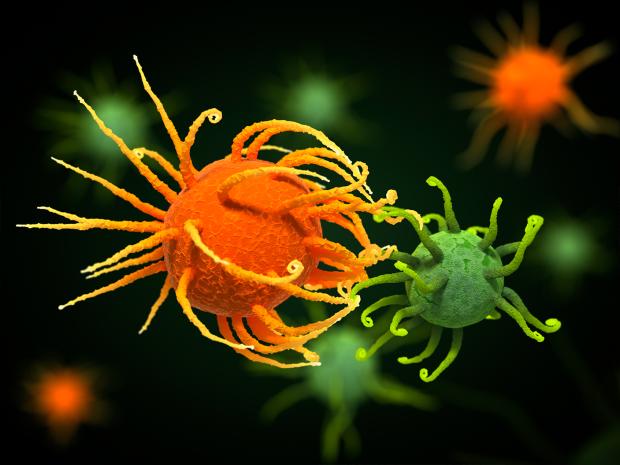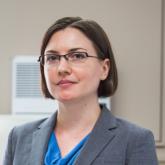- Academics
Biomolecular Science, B.S.

Scientists working at the interface between biology and chemistry create big changes while working on the cellular and molecular level. Genetically modified crops allow feed quickly growing populations, while novel therapies, such as artificial organs, extend life. Biomolecular scientists also address ecological issues — such as producing cheap energy from renewable sources (like producing oil from algae), while others clean the environment through bioremediation. A B.S. in Biomolecular Science is also a suitable starting point for careers in medicine. Our program was developed in cooperation with deans from major medical schools, and graduates have gone on to Harvard Dental School, Mount Sinai Medical School, and NYU Medical School, among other medical programs.
Our B.S. program in Biomolecular Science lets you join in their efforts to improve the world. The first 2 years of the program focus on core courses so you have a solid foundation in the fundamentals of the science — math, physics, chemistry, and biology. From there, you can concentrate your studies in biomedical science, biotechnology, or chemistry.
About the Program
BS/MS Program
Prospective students with superior admission qualifications may be selected to participate in our B.S./M.S. Program, which lets you earn 2 degrees at once — a B.S. in Biomolecular Science and a M.S. in Bioinformatics, Biomedical Engineering, Biotechnology, Biotechnology and Entrepreneurship, or Chemistry. Depending on your preparation and goals, you can complete both degrees in as little as 4 years.
Once You Have the Degree
Students in biomedical science can find work developing artificial organs, prosthetics, or other medical devices. Those who concentrate in biotechnology join the quickly growing field where antibiotics, vaccines, and hormones are produced through genetically based technologies. Others who focus on chemistry find employment in pharmaceutical companies or related industries.
Curriculum
Courses
A minimum of 128 credits is required for the BS in Biomolecular Science. Below are the number of credits required in each subject to complete the degree depending on your selected option.
| credits | |
| Chemistry | 31 |
| Biology | 22 |
| Research* | 8 |
| Computational | 3 |
| Engineering and Technology Forum | 1 |
| Humanities/Social Sciences | 16 |
| Mathematics | 8 |
| Physics | 11 |
| Technical electives | 20 |
| Total Credits | 128 |
Electives
(1) Students placed by examination or an adviser into MA-914 must defer registration for MA-UY 1024; MA-UY 1024/1124 may be replaced with MA-UY1324/1424.
(2) CM-UY 1032 is not required and cannot be taken by transfer students or students changing major after the freshman year.
(3) CS-UY 1133 may be replaced with CS-UY 1114; either course satisfies the requirements
(4) Choice of Humanities and Social Sciences electives must conform to the Tandon requirements described in the Bulletin. At least one elective must be an ethics course, such as PL-UY 2144.
At least one elective must be at the 3xxx/4xxx level. At least one elective must be a writing-intensive course labeled by “W” and must be taken at Tandon.
Students may take a maximum of 4 courses or 16 credits at other schools of NYU.
(5) Students who wish to accelerate their progression through the Biology (BMS) requirements can take BMS-UY 3114 Genetics and BMS-UY 3314 Advanced Cell & Molecular Biology I earlier in their sophomore year instead of selecting an HuSS elective. However, this is a more difficult option which may not be suitable for everyone.
A detailed discussion of the pros and cons with an academic advisor is highly recommended.
(6) Elective options:
(i) At least two technical electives must be selected from the following courses: BMS-UY (level 3 and 4), CM-UY (level 3 and 4), BT-GY, BE-GY and BI-GY (collectively referred to as “Group 1”).
(ii) At least two technical electives must be selected from the following courses: A Group 1 course (as defined above), MA-UY, CS-UY, PH-UY, CBE-UY or, with advisor’s permission a technical elective related to BMS major at another school of NYU (collectively referred to as “Group 2”). Students may take a maximum of 4 courses or 16 credits at other schools of NYU.
(iii) The remaining courses (up to 8 credits) are free electives, for example, a course related to management, finance, or media studies (advisor’s permission is required).
(7) Students electing senior research must take both semesters of research and write a BS thesis. Students may replace research and thesis with 8 credits of technical electives from Group 1 or Group 2, but at least one course must be chosen from Group 1.


